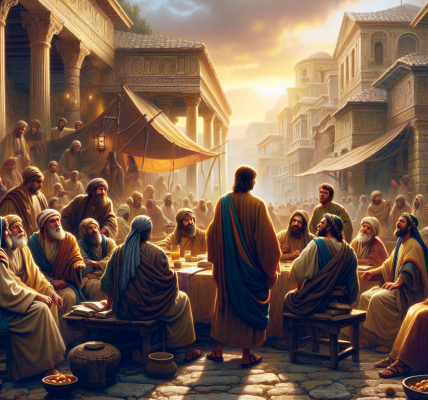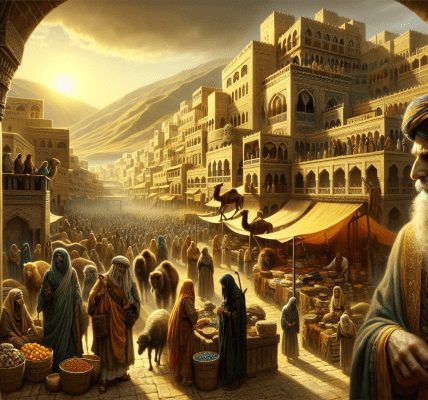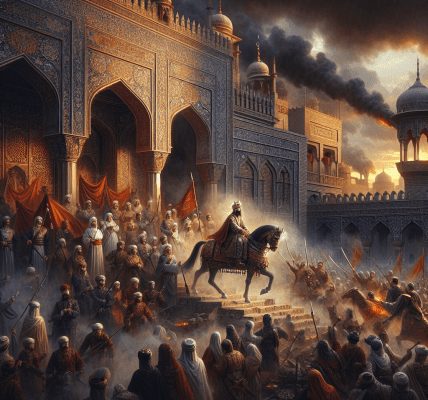**The Fiery Discourse of Elihu**
The great debate between Job and his three friends—Eliphaz the Temanite, Bildad the Shuhite, and Zophar the Naamathite—had reached its bitter end. The air was thick with silence, heavy with unresolved tension. Job, seated in the dust, his body covered in painful sores, had defended his integrity relentlessly, refusing to accept that his suffering was divine punishment for hidden sin. His friends, convinced of their wisdom, had exhausted their arguments, yet Job remained unshaken in his claim of innocence.
Then, from the edge of the gathered crowd, a young man stepped forward. His name was Elihu, son of Barachel the Buzite, of the family of Ram. He had been listening all this time, his heart burning within him as the older men spoke. His cheeks flushed with restrained passion, his fingers twitching at his sides. He had held his tongue out of respect for their age, but now, seeing that wisdom had not prevailed, he could remain silent no longer.
Elihu was not like the others—neither one of Job’s accusers nor one of his defenders. He was a man aflame with a different understanding, a messenger of divine insight burning to be heard. His eyes, bright with intensity, locked onto Job, then swept over the three friends.
**”I am young in years, and you are aged,”** he began, his voice trembling with earnestness, **”therefore I was afraid and dared not declare my opinion to you. I thought, ‘Let days speak, and many years teach wisdom.’ But it is the spirit in man, the breath of the Almighty, that gives understanding. It is not the old who are wise, nor the aged who understand what is right.”**
The wind rustled through the desolate landscape as Elihu’s words gathered strength. He had waited patiently, but now his conviction surged like a river breaking through a dam.
**”Listen to me, let me also speak!”** he urged. **”Behold, I have waited for your words, I have listened to your reasoning, while you searched out what to say. I paid close attention to you, but none of you has refuted Job or answered his words convincingly. Do not say, ‘We have found wisdom; let God refute him, not man.’”**
Elihu’s chest rose and fell with rapid breaths. He had seen the flaw in their arguments—they had condemned Job without true insight, and Job, in his despair, had come dangerously close to accusing God of injustice. Neither side had spoken rightly.
**”Job has declared, ‘I am righteous, but God has taken away my right. In spite of my right I am counted a liar; my wound is incurable, though I am without transgression.’”** Elihu’s voice grew firmer. **”But I tell you, this is not so! God is greater than man. Why do you contend against Him, saying, ‘He will answer none of man’s words’? For God speaks in one way, and in another, though man does not perceive it.”**
The listeners stood transfixed. Elihu’s words carried an authority that was neither harsh nor condescending, but filled with a fervent desire to reveal truth. He was not here to crush Job further, nor to defend the faulty reasoning of the three friends. He was here to proclaim the justice and majesty of God—to correct, to enlighten, to prepare the way for the Lord’s own voice.
**”Behold, God is mighty, and does not despise any,”** Elihu continued, his hands gesturing toward the heavens. **”He opens the ears of men and terrifies them with warnings, to turn man aside from evil and keep him from pride. If they listen and serve Him, they will spend their days in prosperity and their years in pleasure. But if they do not listen, they perish by the sword and die without knowledge.”**
The sun hung low in the sky, casting long shadows as Elihu’s speech unfolded. His words were a prelude to the storm of divine revelation that would soon follow—a storm that would humble Job and silence all debate. For now, the young man’s voice rang clear, a herald of the Almighty’s approach, calling all to recognize the unfathomable wisdom and righteousness of God.
And so, with passion unquenched and truth unyielding, Elihu prepared the way for the Lord to speak from the whirlwind.




